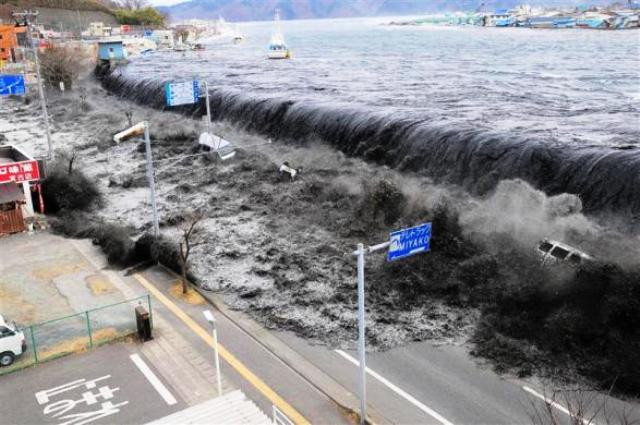I still remember clearly how me and my friends were laughing out loud at every scene of the movie 2012, back in 2010, when we sat together to watch it .We never thought that this natural chaos shown in that movie would ever happen to us until July of last year.
The print, electronic and social media began to frantically scream about the great floods in Pakistan in which around 1,985 people lost their lives, nearly 40 million people affected and a loss of $43 billion had to be endured by the already sick economy. The floods were something that touched each and every one of us, as watching live pictures of our fellow country men stranded in floods from Khyber to Thatta was heart-breaking.
These images made me wonder, is it the beginning of the end? However, being one of those few optimistic individuals left in Pakistan, I discarded this thought and brushed it off as an absurd notion.
The inception of the winter of last year however, had something else in store for me. My friend in London, who was planning to come to Pakistan, was stuck at the airport for days when no plane could take off because the snowfall in Europe had broken all previous records. Life throughout Europe came to a grinding halt. Several train services had been delayed or cancelled across Europe leaving many travelers stranded. UK, France and Germany were amongst the worst-hit countries.
What followed this were floods in three continents and drought in Africa. Climate change intensified the monsoon rains that triggered record floods in Australia’s Queensland state. The Queensland floods have killed 16 people, since the downpour started last month. They are inundating towns, crippling coal mines, and are swamping the state’s main city of Brisbane.
Moving to Latin America, avalanches of mud and debris, triggered by flash flooding in Rio de Janeiro, buried entire towns and smashed roads and bridges in the region. The death toll in Brazil's worst landslides in decades is likely to hit 1,000 as authorities warned that hundreds were still missing. The waves of mud hit with such force that the geography of the region has been changed profoundly.
Coming back to Asia, soon after the flooding in Pakistan, Srilanka witnessed flooding which affected 1.25 million people. Over in Africa, severe drought caused increasing hunger affecting 10 million people in four countries. In Niger, the worst-affected country, 7.1 million are hungry, with nearly half considered highly food insecure because of the loss of livestock and crops coupled with a surge in prices.
That was it! I was compelled to research this surge in natural calamities, as I had began to realise that it’s time we mend our way, or else, our future prospects would seem dim, as best. My findings were catastrophic. The UN had declared the year 2010 to be one of the deadliest years for natural disasters in the past two decades. 373 disasters had been recorded last year, of which 22 were in China, 16 were in India, and 14 were in the Philippines. Moreover, natural disasters caused $109 billion in economic damage last year, three times more than in 2009, with Chile and China bearing most of the cost.
I discovered that the emissions of carbon dioxide, the principal greenhouse gas, scaled new peaks in 2009, and 2010 was on course for becoming one of the three warmest years on record. Moreover, the decade 2001-2010 was stated to be the hottest ever.
However, something which amazed me was what Christiana Figueres’s ( head of the U.N. climate secretariat) statement. He claimed that climate chaos will also lead to wars among countries, meaning that one could be at risk of danger from both, natural calamities and man-made calamities.
Even after the biggest disaster of 2011 i.e. the Japanese earthquake and tsunami which killed more than 12,000 and led to the worst nuclear crisis, where do we stand? What have we done so far? The Kyoto Protocol's commitments run out at the end of 2012, and Japan has bluntly refused calls to extend it tentatively. The treaty only requires wealthy nations to cut emissions, but the United States rejected it in 2001.
The much talked about Cancun conference produced nothing concrete, except to meet in Durban, South Africa in 2012. It was marred by protests by green peace, the failure of the Copenhagen conference, and internal rifts between developed and developing countries. There were no carbon dioxide emissions reduction targets to reach. However, each country could pledge its own target, and the UN could check to see if they are achieved.
The influx of 15,000 people attending the UN conference left a massive carbon footprint. The Mexican government puts the figure at 25,000 tonnes based on emissions caused by flying people across the world, busing them between conference venues, feeding them and providing electric power. This carbon footprint was equivalent to the output, over two weeks, from a small African nation of the type the UN wants to save.
It is in Durban, South Africa, where the rich and the poor have decided to meet again to decide your and my future. However, whatever the results are, for the sake of humanity and planet earth, I have already gone green. Those of you who want planet earth to survive beyond 2012, and prove the makers of the movie 2012 wrong, please change the way you live. Cut your carbon footprint, recycle as much as possible, reduce your use of water and electricity, reuse paper and plastic, use less heat and air conditioning, buy energy-efficient products, plant tees, encourage others to conserve, and do whatever you can to adopt a green life style.
Armageddon 2012: Will the world succumb to climate change?
Those who want the Earth to survive beyond 2012, and prove the makers of 2012 wrong, please change the way you live.



COMMENTS
Comments are moderated and generally will be posted if they are on-topic and not abusive.
For more information, please see our Comments FAQ